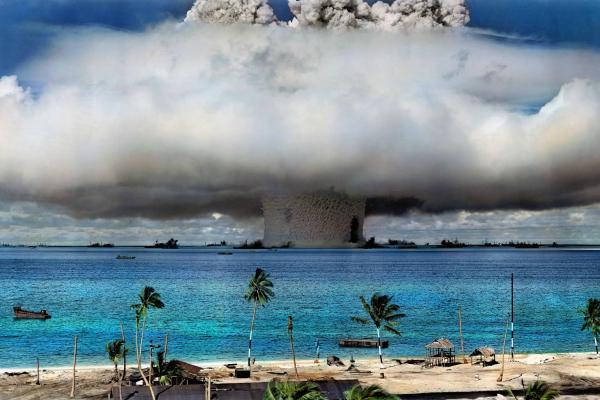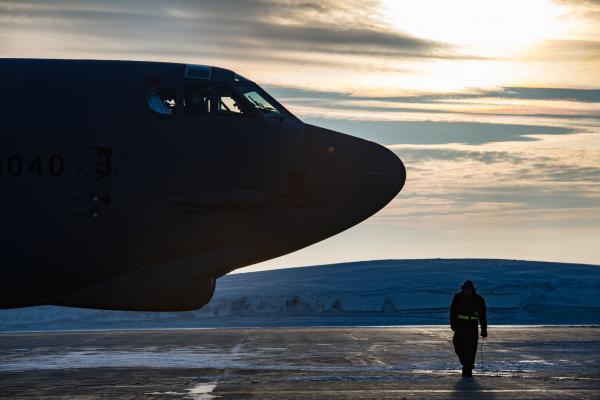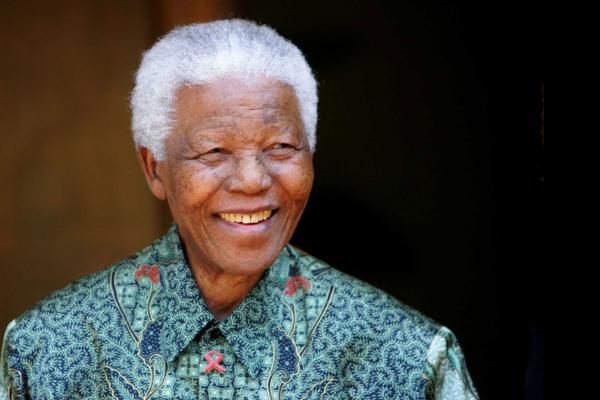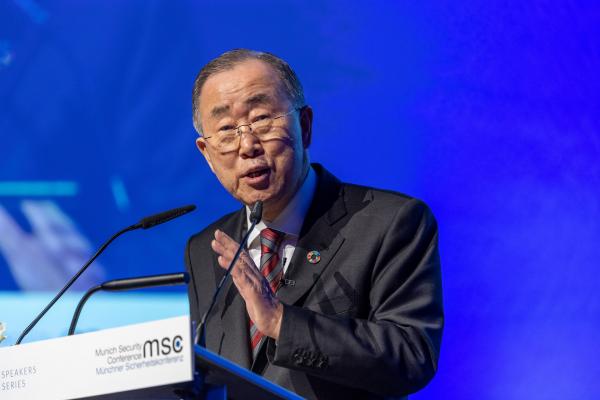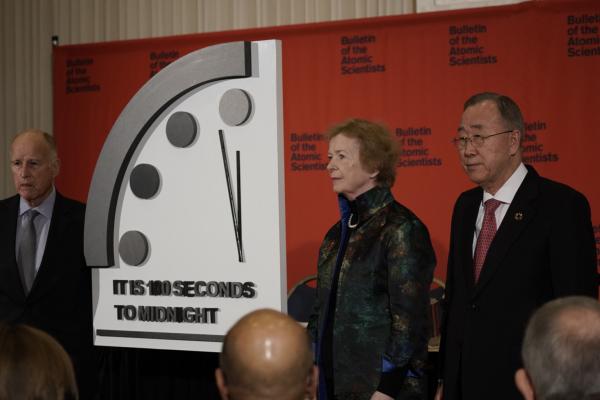The lack of concern and absence of political will risks nuclear catastrophe

Mary Robinson highlights failures around non-proliferation consensus building which has allowed for the termination of several nuclear agreements.
This speech was delivered at a panel discussion on the future of arms control at the Carnegie Endowment for International Peace in Washington DC, on 26 September 2019.
Thank you George and thank you to all at the Carnegie Endowment for International Peace for arranging this lunch event today and giving myself and Dr Brundtland the opportunity to address you on the future of arms control. I look forward to an insightful discussion.
It is fitting that we are meeting to discuss the future of nuclear arms control on this day, the International Day for the Total Elimination of Nuclear Weapons – an occasion on which we should all focus our minds on the threat posed by nuclear weapons.
And let us take a moment to do just that. When the first atomic bomb exploded over Hiroshima on August 6, 1945, it made no distinction between civilians and combatants. Virtually all those within half a kilometre of the blast were instantly incinerated, boiled or crushed to death. Those who were not immediately slaughtered died terrible deaths soon after from burns, wounds and later, radiation sickness. Altogether, the bombs detonated over Hiroshima, and three days later over Nagasaki, claimed hundreds of thousands of lives.
As we talk of deterrence, and doctrine and non-proliferation, it is only right that we remind ourselves that there is a humanitarian and moral bottom line behind these words. One of terrible, indiscriminate human suffering.
The threat posed by nuclear weapons is one of two great existential threats facing humanity today – the other being, of course, the climate emergency. The world is now closer to a nuclear catastrophe than at any time since the height of the cold war.
However, the seriousness of the threat, the scale and horror of a potential catastrophe, and discussion on what can be done to deescalate the risk have been given a shockingly low amount of consideration by political decision-makers, opinion formers and the public.
This lack of attention allows failures to preserve agreements and build consensus on non-proliferation to go broadly unnoticed and unchallenged. There is an unravelling going on and it is largely unnoticed and unchallenged. We have seen the termination of the INF, the collapse of the JCPOA, and real concerns over the future of New START, CTBT and even the Non-Proliferation Treaty.
Set against this lack of concern for the risk, and apparent absence of political will to support the existing safeguards, The Elders have developed a set of proposals that we believe would significantly contribute to increasing global security and reducing the threat of nuclear catastrophe.
My fellow Elder, Gro Brundtland, will speak further about the details of what we propose, but I will take a short while to elaborate on our concerns about the state of nuclear arms control.
We believe that the recent breakdown of much of the arms control architecture, and increasing uncertainty over remaining agreements, risks fueling a new nuclear arms race and increases the risk of accidental nuclear conflict.
The breakdown of the INF Treaty presents once such risk. Its termination in August removed all limitations on the ability of the US and Russia to develop intermediate range land-based missiles. This is an immediate concern not only for Europe, which may once more be within range of Russian intermediate-range missiles, but also in Asia.
We believe it would be very dangerous for the US to use the end of the INF Treaty to deploy intermediate-range missiles in Asia, which could risk fuelling an arms race involving China, India and Pakistan in the worst case scenarios. There is an urgent need for good-faith diplomatic efforts between the US and Russia to limit the fallout from the termination of the INF Treaty, including through exploring whether alternative agreements could be reached that might preserve some or all of the benefits derived under the Treaty.
Looking to the future, we see significant risk in the uncertainty around the prospects for the extension of New START. It would send a deeply negative message to the world if this crucial bilateral agreement between the US and Russia were allowed to expire in February 2021.
It is the sole surviving agreement between the two major nuclear states and its collapse would not only eliminate the only remaining constraint on their nuclear arsenals, but would also remove the monitoring and inspection capabilities which have provided both countries with unprecedented transparency over each other’s stockpiles.
As we understand it, the position of the Trump administration is to seek to bring China into an expanded version of New START. We agree with the general principle that bringing China into discussions on arms control is a good thing, and meaningful dialogue should be sought on issues such as transparency of nuclear stockpiles.
But China’s nuclear warhead count is only one-twentieth of the size of the US and Russian stockpile and virtually none of these are actively deployed. It would therefore be nonsensical to try to integrate China into New START or any agreement remotely resembling it, and it would be foolish to make New START extension contingent on China’s participation.
Therefore, given the very limited time before the scheduled expiry of New START in February 2021, we would urge the US Government to begin serious negotiations with Russia and seek to extend the treaty for a further five years.
Whilst the stalling New START process represents a failure of crucial bilateral negotiations, we are also concerned to see the absence of progress on key multilateral agreements too. We note with alarm, for instance, reports that the Trump administration is considering revoking the US signature to the Comprehensive Nuclear Test Ban Treaty.
Although the CTBT has yet to enter into force, it has already contributed significantly to the establishment of global norms against the testing of nuclear weapons, with the support of over 300 international facilities to detect and monitor nuclear detonations. Revoking the US signature to this treaty would send a worrying signal to the rest of the world that nuclear testing may no longer be an unconditionally illegal act, and would undermine an essential tool for the monitoring of nuclear activity in DPRK and elsewhere in the world.
The termination of the INF treaty, the potential expiry of New START and the uncertain future of the CTBT put the world on a perilous trajectory of mistrust and miscalculation.
This path reaches a significant fork in the road In April 2020 when the world will meet to review the Non-proliferation Treaty. Ratified by all of the permanent members of the Security Council, in addition to almost all UN member states, this is the cornerstone of the global non-proliferation and disarmament regime.
Failure to reenergise negotiations at this juncture could put at risk the near-universal global commitment to non-proliferation and push more countries to seek their own nuclear weapons programmes.
Alternatively, seizing this moment to demonstrate continued commitment to disarmament could be the turning point in the other direction. The Elders call on the US and all other nuclear states to take this opportunity to demonstrate renewed and unwavering support for both non-proliferation and disarmament, which they are of course legally obliged to work towards under the NPT.
Next year marks the 75th anniversary of the end of the Second World War and of the birth of the nuclear age, founded in misery and unprecedented destructive power at Hiroshima and Nagasaki. It will be a year full of significance for those who care about our world’s ability to work together, and who wish to overcome the divisions that have sadly become increasingly dominant in international political discourse. I hope that we can seize that moment to re-join the path together and ensure our world never witnesses such nuclear atrocities again.
We are at a dangerous moment; we need to alert people, we need to discuss the issue, and I am therefore delighted that we are going to have a stimulating conversation here today.
Thank you.
Watch Mary Robinson's speech at the Carnegie Endowment for International Peace:


